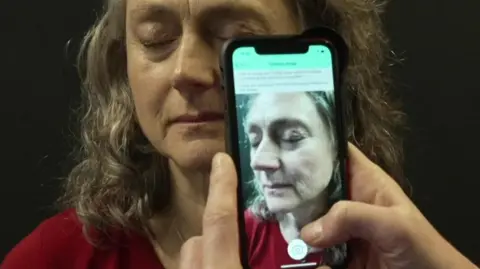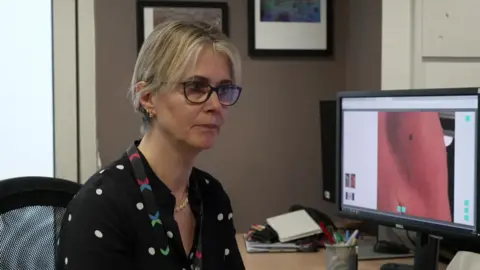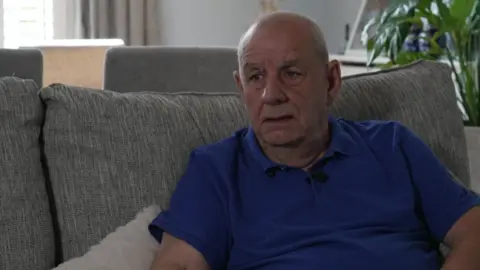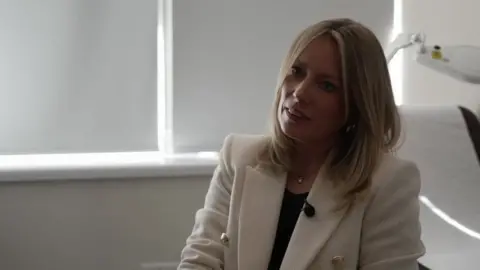AI used for skin cancer checks at London hospital
 BBC
BBCAn NHS hospital in west London is pioneering the use of Artificial Intelligence (AI) to help check for skin cancer.
Chelsea and Westminster Hospital said its AI technology has been approved to give patients the all-clear without having to see a doctor.
Once photos are uploaded to the system, the technology analyses and interprets the images, with 99% accuracy in diagnosing benign cases, the hospital said.
Thousands of NHS patients have had urgent cancer checks using the AI tool, freeing up consultants to focus on the most serious cases and bringing down waiting lists.
The system conducts the checks in minutes, with medical photographers taking photos of suspicious moles and lesions using an iPhone and the DERM app, developed by UK firm Skin Analytics.
The images are then transferred to a desktop computer for greater analysis before the tool determines the result.
Patients with benign cases are then discharged without any input from a specialist, except in a small number of cases.

The hospital gets about 7,000 urgent skin cancer referrals each year, but only 5% turn out to be cancer.
Consultant dermatologist at the hospital, Dr Louise Fearfield, said: "We wouldn't be able to keep up with the numbers of patients that are coming through as urgent skin cancer referrals without (the technology).
"I don't think we'd manage and patients would be missed or be waiting and wouldn't be getting their diagnosis in a timely fashion."
Jimmy Tovey decided to get one of his moles checked using the AI tool after his brother Jeff was diagnosed with melanoma. Thankfully he got the all-clear.

"They took a picture. That was it," he said.
"It might have been the day after, or the day after that, I got a phone call and they just said, 'Mr Povey, it's nothing - it's a mole, nothing to worry about'.
"So all the worry was gone in two days."
The AI tool has since been rolled out at more than 20 other NHS hospitals to assist doctors in their decision making, and in total it has helped to detect over 14,000 cases of cancer in the UK.

Roger Chinn, chief medical officer at Chelsea and Westminster Hospital NHS Foundation Trust said: "Waiting for a hospital appointment and diagnosis can be an anxious time, especially when there are concerns about a mole or skin lesion.
"This is a big step forward in diagnosing and treating skin cancer more efficiently.
"It means that dermatologists have more time to focus on urgent cases, helping to save lives and improve the patient experience."
Dr Lucy Thomas, another consultant dermatologist at the hospital, said the hope is to eventually have AI diagnostic tools that patients can use themselves.
"The idea is definitely to get this closer to patients so they can benefit from it.
"At the moment that technology is limited because you need a dermoscopic lens which the public wouldn't necessarily have access to, but I'm sure with time the technology will advance and we will have effective apps that patients can access from the comfort of their own home."
Listen to the best of BBC Radio London on Sounds and follow BBC London on Facebook, X and Instagram. Send your story ideas to [email protected]
